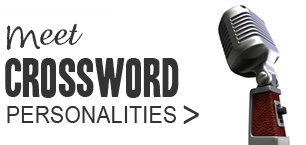
Neyartha's crosswords had personality. When we solved a Neyartha crossword, we keenly sensed the tastes and temperament of the person who created it.
A mirror of the setter's mind
Some setters tell us plenty about their likes and dislikes through their crosswords. It doesn't take long to learn that Anax is musically inclined and milks the most out of unexpected word meanings in his clues. Rufus's penchant for the cryptic definition is apparent, as is his nautical background. Cryptonyte is clearly a sports lover, Spiffytrix a film buff. John Halpern (aka Paul)'s puzzles carry the stamp of his unique brand of humour.
Not every setter is so conspicuous. Sankalak of The Hindu, for example, always a comfort to solve, does not put much of himself into his puzzles. There is also the case of setters having to abide by the standard "house style" of the publication, as with the Times crossword. This may come naturally to some setters, not to all. Talking of his puzzles in the Times, Anax says in his interview:
After a couple of puzzles that needed too much editing before being right for publication it was clear that my style was going awry. Remember, Times puzzles don’t appear under a pseudonym, so solvers don’t get that ‘signature’ feeling. It’s a house style, not an individual one, and it’s very easy to step outside the discipline that such a style demands.
What about preferences on more sensitive topics, like political inclinations or ethical views? Should setters keep those to themselves or let their crosswords reflect them?
The book Pretty Girl in Crimson Rose (8) talks of a special Guardian crossword set by Araucaria in 1994, soon after the first democratic elections in South Africa. The preamble to this crossword said it was "A tribute on election day to the fighters for democracy, especially martyrs such as 6, 16 and 3." The idea came to Araucaria late and he asked the editor to hold the back page for a special crossword. When asked why he did it, Araucaria replied:
These were people I thought Guardian readers should know.
This isn't just about wordplay for some setters, then; this is an expression of their values, their stand on issues that affect the world.
And why not, the setter may ask. If creating crosswords is an art, self-expression should be its prime function just as for writing poetry or painting.
How well are opinionated crosswords received?
The track record shows that extremely opinionated crosswords divide solvers into love/hate camps.
Guardian 24930 by Brendan is a textbook example. When this politically charged crossword was published in 2010, it received widely divergent comments ranging from "stunningly witty", "moving", "one of the best I’ve seen in more than thirty years of solving the Guardian crossword" to "bad taste", "one of the most unsatisfactory Guardian crosswords I’ve seen in forty-odd years"!
Over to you
As a solver, how do YOU like your crossword? Do you enjoy those in which the setter's self is overtly stated? Or do you prefer the setter to stay in the background, remain objective and let play of language reign supreme?
If you are a setter, what is your style? Are you mindful of personal tastes and judgements colouring your puzzles?
Related Posts:
- Attention film-makers: Cruciverbalists are not oddballs!
- Unriddle the self-referencing setter
- Do you make these mistakes when writing clues?
If you wish to keep track of further articles on Crossword Unclued, you can subscribe to it in a reader via RSS Feed. You can also subscribe by email and have articles delivered to your inbox, or follow me on twitter to get notified of new links.








 Follow on Twitter
Follow on Twitter Join us on Facebook
Join us on Facebook Get RSS
Get RSS

9 comments
Personally, I love a theme and I think a theme works best when the subject matter is passionate about the subject matter in question.
In my case (as an occasional setter) I'm all about food, which is helped by the fact that my only regular gig is to set crosswords for Fire & Knives, a quarterly magazine for new food writing. But even if I'm not setting a whole crossword around the theme I often find myself leaning towards clues that have a foodie leaning. (Sometimes cricket creeps in too. There's at least one example of the latter in my latest offering, kindly posted online by Anax.
In general I really enjoy it when I discover a theme or an obvious hobbyhorse/bugbear being expressed through a crossword, even if it's just a couple of clues rather than a full-blooded theme. The more personality the better.
Oops. That first sentence should have read "... when the *setter* is passionate about..."
I think it's pretty clear where I stand - the crossword belongs to the setter, the paper is just incidental. It is a medium to get to the solvers.
The major reason why it is considered odd for a setter to stamp his mark on a crossword is because majority of the cryptic crossword fraternity belongs to the older generation. No disrespect intended here, just that the belief system has undergone a major change over the years. We now believe in viewspapers, user generated content and more power to the man behind the voice as opposed to the institution. This bias is apparent when you compare the setter styles you mentioned - Neyartha, Spiffy and self belong to the newer crop and neutral setters perhaps to the older generation.
If a paper appreciated just one particular style, it could have its quota filled by 2-3 setters. It's because the audience values difference in styles. I'd think that forms the cornerstone of cryptic crosswords - looking at things from (many) different angles.
I guess it depends on whether you agree with the views implied in the crossword -
the same as any newspaper article.
In a themed puzzle I could be amused, bored or neutral depending on my level of interest in the theme. E.g. I was amused by a guardian puzzle themed upon the Fawlty Towers comedy series but a crossword with a political theme would probably
bore me. There are so many crossword puzzle choices these days any setter alienating a large part of the audience will not prosper !
For me there’s a huge difference between a crossword saying something about your personality and using crosswords to express opinion.
The former is inevitable for most of us. All writers are advised “Write about what you know”, and if we have hobbies/interests outside crosswords they are things about which we will have immediate knowledge to call upon. It isn’t a desire to promote that knowledge – in my case, given a slot to fill with a letter or two in place I’m more likely to see the name of a band or a song than, say, a character from Dickens. It’s just an automatic thing. Similarly, personality comes across in what we find funny, and if I incorporate humour into a clue it will generally be my type of humour (i.e. a bit silly).
The latter is more dangerous, but I don’t think it’s wrong. Setters just have to be aware that if they choose to “politicise” a crossword clue (or the whole puzzle) they will be both applauded and criticised for it – all that matters is whether or not they are happy to accept both. As to whether or not they respond to those comments… well, perhaps that needs an article of its own!
My vote is for trying out fancy themes and Ninas in the grid. It really enhances the entertainment value, especially once you have cottoned onto the theme.
As far as the setter's personality coming up in clues goes, that's fun as well. A setter with eclectic tastes may perhaps find it easy to provide variety and meaning to his clue surfaces. It will be good when solving crosswords is not just about cracking clues but also involves some GK and vocab building.
BTW, Anax's Dickens comment reminds me of a certain 'PLEASE SIR I WANT SOME MORE' that he clued sometime back. Such phrases generally uncommon in crosswords also help to make puzzles spicier.
But just one bottom line when the setter employs any of the above: fair cluing should not be compensated at any cost or the puzzle should not become exceedingly difficult!
Anax's comment about using crosswords to express opinion reminds me of an interesting clue by Arachne in the Guardian. She had defined YODELS as "horrible noises" - not everyone was pleased with that! Arachne responded on the blog to say, she still thought yodelling was awful (or something to that effect).
It can be hard to separate opinion from fact sometimes, as when writing a clue about a celebrity. The setter must define the person in only a few words - of all the traits of this person, which does the setter pick? The setter's personal opinion will almost certainly influence this choice.
---
To the anonymous commenter: Please do not try to use my blog for making personal attacks against other setters of The Hindu. Such comments will not get published.
What i feel is that setting a themed crossword and the crossword setter leaving his own personal touch on the crossword are slightly different things. I personally think Crossword setters should add their own little something to the crossword.. That spices up things and makes things interesting..And i want to reiterate the point that Tony made about youngsters identifying with some themes and topics more easily.. For eg , one of Tony s crosswords had this clue : Initially shoot pig with projectile bird (7) .. And i immediately got the reference to the cult game 'Angry Birds' but in the forums no one got the connection :)..
P.S. - I am rediscovering the fledgling interest that i had in crosswords from college time due through this blog and other Hindu Xword communities and i havent even seen any of the popular and acclaimed international crosswords. So my 'two cents' might be worth even less :)
- Arun Warrier
Hi Arun, Welcome here. Thanks for explaining Tony's clue, I wouldn't have got the Angry Birds link either :)
The view of solvers with fledgling interest is very valuable IMO. As solvers of many years we are at risk of getting accustomed to practices that may actually be unfair, or calling something unfair simply because we haven't seen it done before. It's great to have a fresh perspective.
Post a Comment